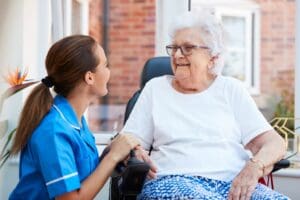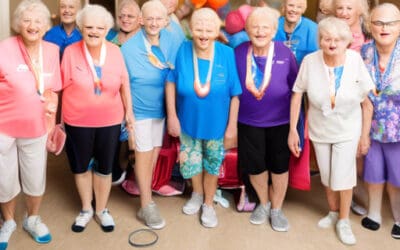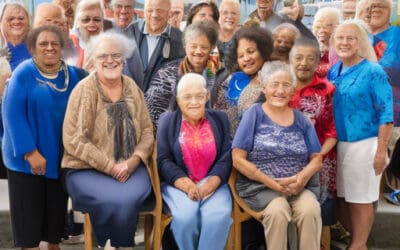Transitional Assisted Living Program Benefits
As they age or recuperate from medical treatments, people often need more attention than they can get at home but don’t need long-term nursing care. A short term assisted living can help. These flexible living programs allow those who require temporary support to return to daily life or find a permanent home.

Residents in short-term assisted living receive physical, emotional, and social support. Their customized healthcare management is a significant benefit. Skilled specialists oversee residents’ health and well-being with tailored care. This care includes regular assessments, medication management, and healthcare professional coordination to meet each person’s health needs.
Another benefit is daily life assistance. Due to aging or medical issues, bathing, dressing, and eating may be difficult. Helping with daily duties can reduce falls and improve residents’ quality of life. Nutritional care ensures that people receive appropriate nourishment for recovery and health by tailoring meals to their needs.
Short Term Assisted Living emphasizes social engagement and encourages resident interaction. Socialization helps prevent loneliness and isolation throughout healing and aging, which is essential for emotional well-being. Group trips, special event celebrations, and hobby-based clubs create community and belonging.
Additionally, these programs give families much-needed relief. Without expert training, caring for a loved one is emotionally and physically draining. Short-term assisted living lets families relax, knowing their loved one is safe, professional, and caring. This peace of mind enables families to recharge, care for personal concerns, or rest, improving family dynamics and well-being.
Another benefit is transitional programs’ adaptability. These institutions generally offer flexible programs to meet residents’ requirements. After surgery, a patient may need significant physical therapy and regular medical tests. They may need less supervision and more light exercise as they recuperate. Facilities can change care as required, allowing patients to navigate between recovery stages without moving.
These programs can lead to other assisted living options. Short stays allow potential long-term care recipients to evaluate the facility’s staff, services, and atmosphere. This experience can help people and their families make better long-term care decisions. Living in an assisted environment, even temporarily, can help people accept it as a long-term solution.
Transitional assisted living has significant psychological benefits. The atmosphere encourages independence within safety and health, which boosts confidence and mental wellness. Having a safety net of professional care allows people to test their boundaries in a controlled context, which can speed recovery and increase resilience.
Short-term assisted living can save many families money. It avoids the need for costly house adaptations or full-time home care, which may not be viable for short-term recovery. Focusing on the duration and type of care needed helps families manage healthcare expenditures and reduce the financial hardship of long-term care.
Technology in transitional assisted living improves care quality and efficacy. Electronic health records, telemedicine, and automated medication dispensing systems improve care delivery and treatment accuracy in modern hospitals. Technological integration enhances health outcomes and makes inhabitants more engaged and participatory.
Transitional assisted living provides a compassionate and professional atmosphere that recognizes each individual’s unique needs for healing and aging. These programs are significant resources in the continuum of care because they provide flexible, tailored treatment that supports physical, emotional, and social well-being.

Short-Term Assisted Living Improves Post-Surgical Recovery
Surgery recovery requires careful health, mobility, and daily activity management. Short-term assisted living is ideal for post-surgical healing since it provides specialized care. This care accelerates recovery and reduces the risk of problems from poor post-operative care.
Patients often need intensive care in the weeks after surgery to ensure their overall health. Short-term assisted living facilities provide this varied care. Pain management is crucial for surgery patients in such settings. Effective pain treatment helps patients relax and participate in rehabilitation. Skilled nurses manage pain and boost healing by routinely assessing and changing therapies.
Mobility and rehabilitation treatments are essential in short-term assisted living. After hip replacements or cardiac procedures, individuals may struggle to regain complete mobility. These institutes ‘ physical therapists and rehabilitation specialists provide tailored therapy to safely and effectively recover movement and strength. These sessions commonly include exercise, mobility training, and other recovery-related therapies.
Nutrition also affects surgery recovery speed. Nutritional help in short-term assisted living includes appetizing post-surgical meals. Patients may need high-protein diets to repair tissue or low-sodium diets to prevent high blood pressure. Dietitians in these hospitals ensure that each meal helps patients recover and stay healthy.
Additionally, medical supervision is always available in short-term assisted living. Patients recovering from surgery need this surveillance since complications can occur quickly. Regular vital sign monitoring, wound care, and medicinal regimen adherence provide a level of safety that is hard to reproduce at home. Continuous surveillance helps identify potential consequences like infections or poor wound healing, allowing for prompt actions to prevent significant health issues.
Apart from medical care, these facilities offer emotional and social support. Surgery recovery can be unpleasant and mental health-affecting. Support and friendship are essential for mental and emotional health in assisted living communities. Social activities reduce isolation and despair in recovering patients. Social connection, whether through group activities, social dining areas, or just talking to staff and other residents, lifts people’s moods.

Families find comfort in knowing their loved one is in safe, competent care. After surgery, families often feel unprepared for the complexity. Professional, well-equipped short-term assisted living facilities ensure families and their loved ones receive the most excellent care. Families can focus on supporting their loved one through recovery rather than handling care details, reducing logistical and emotional stress.
These institutions often connect patients to home or additional treatment. A successful transition requires education and training for patients and families on home care management. When patients return home, they and their families feel confident and ready to manage their rehabilitation with this educational support.
Advanced technology and therapy equipment speed up rehabilitation in short-term assisted living. Modern medical equipment and technologies assist many rehabilitative therapies and treatments in many facilities. Access to expert services, frequently unavailable at home, can expedite and improve rehabilitation.
Short-term assisted living helps surgery patients recuperate. These facilities allow patients to recover faster and restore their independence and quality of life by addressing their medical, physical, dietary, and emotional requirements. This holistic approach to post-surgical treatment emphasizes the need for a supportive, professional atmosphere during recovery.



